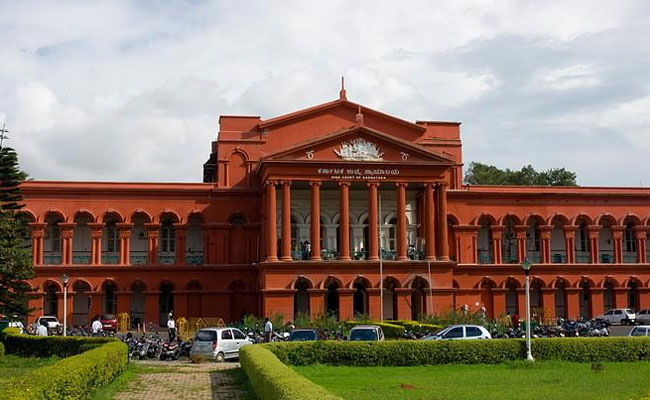Bengaluru (PTI): A convict serving life imprisonment in the church blast case has been granted parole by the High Court of Karnataka for two weeks.
The detenue, Mohammed Akhil, is one of the convicts in the July 2000 church blast case in Bengaluru. Twenty four accused belonging to the Deendar Anjuman sect were found guilty of the blasts that were triggered in Karnataka, Andhra Pradesh and Goa. Akhil was one of the 13 handed a life sentence.
Mubeen Unnissa Begum, wife of Akhil, had filed the petition, which was heard by Justice M Nagaprasanna.
"The convict, as of today, has undergone 23 years of imprisonment without remission and has not been granted parole throughout 23 years. The wife of the convict is now before this court seeking enlargement of her husband on parole on the score that she is suffering from ailments and, therefore, pleads that the presence of her husband is very much required in the family as other family members are also aged and suffering from ailments," the court noted in its recent judgement.
The counsel for the petitioner argued that in July 2023 another convict in the case was granted parole by a co-ordinate bench because the convict's mother was suffering from ailments.
The co-ordinate bench had based its judgement on a 1974 case where it was held that "the court should treat the like-cases alike and if relief is granted to a litigant it needs to be extended to similarly circumstanced litigants as well, there being no derogatory circumstances."
The high court therefore allowed Akhil to be released on parole for two weeks between December 7 and evening of December 20, 2023.
It also directed the Chief Superintendent of Central Prison and the Director General of Police, Prisons and Correctional Services, to "stipulate strict conditions as are usually stipulated, to ensure return of the detenu to the gaol and that he shall not commit any other offence during the period of parole."
Mubeen Unnissa Begum had sought 90 days parole for her husband. The court said the wife of the petitioner can seek extension of the parole "which shall be considered looking at the conduct of the husband of the petitioner - the convict while he is out on parole."
Akhil was convicted for offences under Sections 120B, 121, 121A, 124A, 153A, 426, 437 of the Indian Penal Code for sedition and Sections 3 and 5 of the Explosives Substances Act and Rule 5 and 9B of the Explosive Rules.
Let the Truth be known. If you read VB and like VB, please be a VB Supporter and Help us deliver the Truth to one and all.
Dhaka (PTI): The Election Commission (EC) has demanded extra security for its chief, other commissioners and officials as fresh unrest visibly gripped Bangladesh after gunmen shot an upcoming parliamentary polls candidate and frontline leader of last year's violent street movement dubbed 'July Uprising'.
"The EC has written to the Inspector General of Police (IGP) urging comprehensive security arrangements for the Chief Election Commissioner (CEC), Election Commissioners (ECs), senior officials of the Election Commission Secretariat," the state-run BSS news agency reported on late Saturday.
The EC simultaneously sought the extra security for its field-level offices ahead of the 13th national election, as two of them came under attack in southeastern Lakshmipur and southwestern Pirojpur by unidentified miscreants after the announcement of the schedule for the upcoming polls on Thursday.
The commission demanded an additional escort vehicle for the CEC, while one such police escort with a vehicle was currently in place for him. It asked for round-the-clock police escorts for the four commissioners and the senior secretary.
The letter said the enhanced security measures were "urgent and necessary," while EC officials said their 10 regional offices, 64 district election offices and 522 sub-district level offices would store important documents and election materials.
The EC on Thursday said the upcoming parliamentary election would be held on February 12 next year, while a day later, Sharif Osman Hadi was shot from a close range in the head, critically wounding him, as he initiated his election campaign from a constituency in the capital.
Critically ill former prime minister Khaleda Zia's Bangladesh Nationalist Party (BNP) simultaneously asked Muhammad Yunus' government to provide security for all candidates in the upcoming election after the attack on Hadi, who leads a radical right-wing cultural group called Inquiab Mancha.
"We demand that the real culprit be identified immediately and brought under the law, and we call upon this government to ensure the security of all candidates without delay," BNP Secretary General Mirza Fakhrul Islam Alamgir said.
Hadi was also a frontline leader of last year's student-led violent uprising that toppled then-prime minister Sheikh Hasina’s Awami League government on August 5, 2024.
His Inquilab Mancha was also at the forefront of a campaign to disband the Awami League, which the interim government complied with in May this year, disqualifying the party from contesting the polls.
The government on Saturday ordered a nationwide security clampdown called 'Operation Devil Hunt 2' amid escalated fears over the law and order situation and promised to issue firearms licenses for election candidates for their own security.
Home adviser (retd) Lieutenant General Jahangir Alam Chowdhury said the government had taken steps to ensure special security for the "frontline fighters" of the July Uprising and promised to issue firearms licenses for the election candidates.
He emphasised that the second phase of the 'Devil Hunt' was aimed at helping ensure public safety and combat the growing threat of illegal arms.
The operation was initially launched in February this year following protests over an attack on the private house of a former minister of the ousted government in the northern suburb of the capital, when it targeted alleged "henchmen" and supporters of the now disbanded Awami League.





